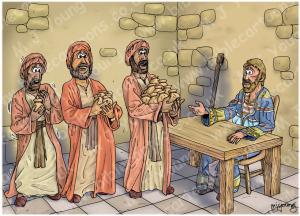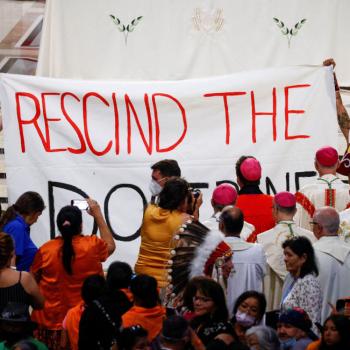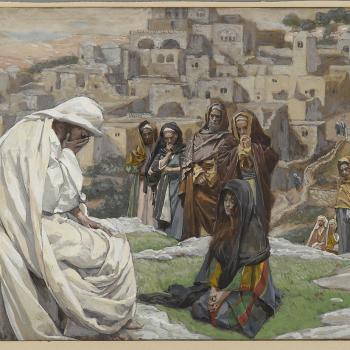
I always pitied the third servant in the Parable of the Talents, the one who got one talent from the master and buried it. Sure, he could have been more enterprising, like the other two servants. They got five and two talents and made five and two talents more. But he wasn’t a bad sort, just timid, not one who takes risks. He kept the money safe, didn’t lose a penny of it, and gave it all back when the master returned. For that he got punished horribly while his fellow servants, the risk takers, received handsome rewards. And that, Matthew says, is what the kingdom of heaven is like! Being the timid sort myself, a classic underachiever, I tended to think about this horrifying story as little as possible.
That was before my acquaintance with the writing of William R. Herzog II. Having written six times already on his approach to Jesus’ parables, I was ready for this one. In Jesus’ telling, as opposed to Matthew’s, this was not going to be a story about heaven. A wealthy householder, rewarding those who increase his wealth and punishing the one who doesn’t, wouldn’t be a stand-in for God. I had learned from Herzog – and not only him – how the rich extorted money from the poor in Palestinian society. The rich man’s expectations and the actions of the first two servants told perfectly how that ancient economy worked. That’s what peasants listening to the story would have heard, and that, not a metaphor for heaven, is what Jesus must have meant them to hear.
I couldn’t guess the point of putting a servant who only hid his master’s money into the story. Chapter Nine of Herzog’s Parables as Subversive Speech centers on that figure. He becomes the story’s tragic hero.
Previous posts in this series on William Herzog’s Parables as Subversive Speech:
- William Herzog Reads Jesus’ Parables, Brings them Down to Earth
- Paulo Freire, the “Pedagogue of the Oppressed”: Is This a Good Fit for Jesus?
- Laborers in the Vineyard: A Reading that Doesn’t Blame the Victims
- The Parable of the Wicked Tenants and the Wickeder Landlord
- The Rich Man and Lazarus, or an Oppressor who Won’t be Taught
- The Unmerciful Servant Parable Trashes Messianic Hopes
The Parable of the Talents (Matthew 25:14-30)
The Parable of the Talents is found in the Gospels of Matthew and Luke. The two tell the story somewhat differently from each other. Herzog follows Matthew’s version mostly, and I will also. But in other research I’ve found that Luke sometimes stays closer to the sources that they both received. He includes a detail that seems particularly relevant. I’ll consider that detail later.
Matthew relates the parable to a previous one about the kingdom of heaven. Herzog proceeds without that connection. In Herzog’s view the parable isn’t about the way God wants his kingdom to go.
Dividing the talents
A man, going on a journey, summoned his slaves and entrusted his property to them. To one he gave five talents, to another two, to another one, to each according to his ability. Then he went away.
The one who had received the five talents went off at once and traded with them and made five more talents. In the same way the one who had the two talents made two more talents. But the one who had received the one talent went off and dug a hole in the ground and hid his master’s money.
The reckoning
After a long time, the master of those slaves came and settled accounts with them. Then the one who had received the five talents came forward bringing five more talents. He said, “Master, you handed over to me five talents. See, I have made five more talents.” His master said to him, “Well done, good and trustworthy slave. You have been trustworthy in a few things; I will put you in charge of many things. Enter into the joy of your master.”
The one with the two talents also came forward saying, “Master you handed over to me two talents. See, I have made two more talents.” His master said to him, “Well done, good and trustworthy slave. You have been trustworthy in a few things; I will put you in charge of many things. Enter into the joy of your master.”
Then the one who had received the one talent also came forward. “Master, I knew that you were a harsh man. You reap where you did not sow and gather where you did not scatter seed. So I was afraid. I went and hid your talent in the ground. Here you have what is yours.” But his master replied, “You wicked and lazy slave! You knew, did you, that I reap where I did not sow and gather where I did not scatter? Then you ought to have invested my money with the bankers. On my return I would have received what was my own with interest. Take the talent from him and give it to the one who has ten talents.”
The conclusion
[The master continues.] “For to all those who have, more will be given, and they will have in abundance. But from those who have nothing, even what they have will be taken away. As for this worthless slave, throw him into the outer darkness, where there will be weeping and gnashing of teeth.”
The parable’s moral lesson as traditionally interpreted
Matthew’s version of Jesus’ story says the master apportioned different amounts to different servants, “to each according to his ability.” The tradition, starting with Matthew, has the master represent God. God’s unequal division of property is morally justified by the unequal abilities of the servants. The manner of distribution finds further justification in the way each servant handles his share. The tradition then finds universal application in the moral lesson: God will, eventually, reward each of us justly, according to the way we use our “talents.”
The word for ability in Greek is “dynamis,” which, literally, is the Greek word for power. Herzog thinks it refers here not to moral qualities or innate ability but to each servant’s position in a power hierarchy. Households of the very wealthy in ancient Palestine mirrored empires. Both required large bureaucracies, and both were highly stratified. Officials rose in the pyramid of power by being better than others at fulfilling the master’s desires. Herzog’s conclusion: The final rewards are not “higher” and “lower” places in heaven but promotions in a very worldly bureaucracy. It is a case of “the powerful becoming more powerful through successful execution of their orders.”
The traditional, moral interpretation of the parable centers especially on the fate of the third servant. He has not used God’s gifts properly; he’s “wicked and lazy,” in the master’s words. His appropriate, if harsh, consequence is a place in “outer darkness” with “weeping and gnashing of teeth.” In Herzog’s reading this place is not hell but an all-too-common place on earth. And he thinks we are not meant to concur with the master’s low opinion of the third servant, or his praise of the first two.
The third servant, the ‘whistle-blower’
Herzog titles Chapter 9 of Parables as Subversive Speech “The vulnerability of the whistle-blower.” This third servant has the guts to stand up to his employer and call him out for the thieving oppressor that he is. “You reap where you did not sow and gather where you did not scatter seed.” A better description of “reaping” and “gathering” by the rich from the pockets of poor farmers is hard to imagine.
Jesus doesn’t spell out what pangs of conscience accompanied this servant’s employment, motivating such a dangerous move. But Jesus’ hearers certainly appreciate it. Their sympathy—and Jesus’—will be with the third servant. I’m guessing Jesus could even see himself as this “whistle-blower,” and heading toward a similar fate.
The master doesn’t take kindly to truth-telling. He “casts out” the servant from his employ and blacklists him with any other possible employer. Not having his own plot of land, the whistle-blower is now among the lowest of the low–a day laborer. He can expect a harsh life from now on, and a short one. Having given up friendship with Palestine’s poor for most of his career, he now alienates himself from the rich as well. Weeping and gnashing of teeth will, indeed, be the story of the rest of his life.
What did the third servant, the hero of the parable according to Herzog, accomplish? Besides dissociating himself from an exploitive system, not much. His positive contribution to society was to withhold temporarily a portion of elite wealth from its usual oppressive role. By burying the one talent, he has taken it out of circulation. It cannot bankroll usurious loans to a peasant farmers for the purpose of taking their land away.
Difficult questions for Jesus’ listeners
The whistle-blower fails because he acts alone. Now he also suffers alone. That raises difficult questions for a peasant audience. Herzog enumerates:
How would you react to a whistle-blower? Would a former [official in an oppressive system] find a welcome in a peasant village? Or would the former hostilities suffocate even the possibility of a latter-day coalition? Do the people of the land realize the role played by [the official]? Do they understand how their bitter animosity … plays into the hands of the ruling elite? Can peasants and rural poor folks realize how their interests can be tied to the very class of people whom they despise?
One has to wonder if the conversation that followed this story might have turned sympathy for the whistle-blower toward answers to any of these questions.
Extra details from Luke (19:12-27)
Luke adds to the parable which he and Luke both found in their sources. Herzog, following other interpreters, says the extra material was part of another, otherwise unknown parable that Jesus told. It makes of Matthew’s householder a nobleman whose trip to a far country was for the purpose of becoming king. In this pursuit, however, he has some opposition. Some of his would-be subjects don’t want him for king. (If he’s the same guy as in Matthew’s version, I can understand.) The opposition fails, the nobleman becomes king, and those in the opposition meet a sorry end. In Luke’s words:
A nobleman went to a distant country to get royal power for himself and then return…. [Before leaving, the nobleman deals out one “pound” each to some slaves to do business with and make a profit. (A pound must be more money than it sounds like.)] But the citizens of his country hated him and sent a delegation after him, saying, “We do not want this man to rule over us.”
[The story continues with reports of what the slaves gained by trading. One gains ten pounds and is put in charge of ten cities. One gains five pounds and receives five cities. (Being “in charge” is not like being the mayor. Mainly it means you get to rake in all of an area’s “surplus” wealth.) Then comes the fate of the last servant and of the new king’s opposition.]But as for these enemies of mine who did not want me to be king over them—bring them here and slaughter them in my presence.
In this version the whistle-blower from Matthew’s version is spokesperson for the king’s opposition and, Herzog says, shares their fate. Again the sympathies of Jesus’ listeners would be with the losers in the parable.
Where do we go from here?
Herzog has considered five parables, none of them comforting for a poor peasant in Palestine. Poor Palestinians don’t lead a comfortable life, and Jesus draws accurate pictures of that life. But the pictures do more than reflect surface reality. They dig into the real causes of poverty and inequality and unmask official mystifications that blame the victims: They’re sinners; they lack God’s favor; that’s why they’re poor. Or, that’s just the way reality is.
The parable ends with a quote of a popular saying:
[T]o all those who have, more will be given, and they will have in abundance. But from those who have nothing, even what they have will be taken away.
Herzog doesn’t tell us, but Matthew and Luke got this saying from Mark, the first to write a Gospel. And in Mark the saying has an introduction from Jesus: “Take care what you hear.” (Mark 4:24) This saying has puzzled people trying to figure out why God would act this way. But really it was a defeatist saying among poor people in Jesus’ day. You can hear the same thing today: “The rich get richer and the poor get poorer.” It expresses resentment against rich people and resignation among the poor. Mark’s Jesus warns us to beware of this saying, to hear it with care.
In the parable it’s the rich and thoroughly discredited master who says it. That should spark at least some doubt about the saying among Jesus listeners. The world doesn’t have to be this way.
Five parables tell it like it is in Palestine’s economy. They give no plan of action, unless it’s in the unrecorded conversations and arguments that follow the telling. But Herzog has four more parables in store. Not a social-justice action plan in themselves, they do find in peasant life and wisdom hope for a world more like the kingdom of God.
Note: I’m working with an online copy of Parables as Subversive Speech, so I cannot cite page numbers. Information used is from Chapter 9.












